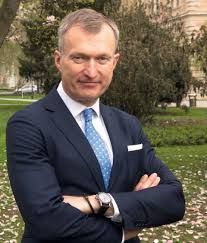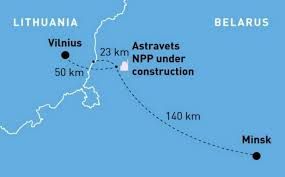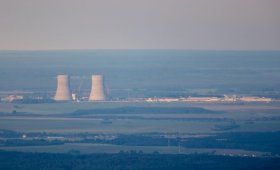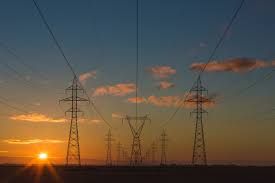Entretien avec Darius Degutis Ambassadeur extraordinaire de la Lituanie pour la Sureté Nucléaire

C'est avec beaucoup d'intérêt que nous avons rencontré Darius Degutis Ambassadeur Extraordinaire de la Lituanie pour la Sureté Nucléaire à Paris. L'Ambassadeur a évoqué lors de cet entretien les préoccupations du pays et des Etats avoisinants de l'Union européenne, sur la construction d'une centrale d'un nouveau modèle en Biélorussie à quelques kilomètres de la capitale Vilnius. Cela a été aussi l'occasion d'aborder les aspects économiques et géopolitiques de la construction de cette centrale. Au total un sujet qui n'a pas l'écho qu'il mérite eu égard à son impact pour tous les membres de l'Union. L'entretien s'est déroulé en anglais.
Darius Degutis is Ambassador Special envoy for the ministry of foreign affairs of Lithuania. He is in charge of the nuclear issues. During a stay in Paris News Press wanted to call on the ambassador about those issues in the Baltic countries and especially in Lithuania. The interview was focused on The nuclear power plant of Astraviets in Belarus and its economic and political effects.
Mister Ambassador can you tell us about this important issue
Astraviets is a nuclear power plant which has been built right on our border in Belarus by Rosatom the Russian nuclear energy giant with the financial support of Russia.
I been asked a year ago by the minister to be his representative on this issue. This issue is of major importance for all our president, prime-minister, all the people, every day we have on TV and in the debates. Why? Not Only because it's been built very close from our borders, approximately 45 kms.
I know that in France there are many Nuclear Powerplants which are close to Luxemburg, different places, but, we are not against nuclear powerplants, we have our own old nuclear powerplants, but we are dismantling them.
So, we have our own experience of the nuclear industry. We are not against Nuclear, we are not like Austria which is green and nothing else. We know how to build, we know how much it takes to close it down, we know how costly it is, we shut down our two reactors in 2004 and 2009. The same type as in Tchernobyl, Of course it was upgraded we had a big program with the Japan and the Sweden for the safety upgrade and it was much safer as Tchernobyl was of course but nevertheless We closed down the first unit in 2004 and the second unit in 2009 but we still have to take out all the nuclear fuel, the first one is clean and the second is 61% complete so it's an another 39% of the fuel which has to be taking out and it has to be stored, treated so it's a big Process. We are also not against Belarus or Rosatom right to have nuclear powerplants, but because of our experience in dealing with nuclear power plants we also know when things are going wrong and things because of many safety violations in Astravets are going very wrong there.

What is eventually the conclusion about this plant?
We believe that this project should be stopped, this is our position. Even though it is already 75-80 % completed, it's moving to an end, but we still believe that there is a possibility to close this project and to build in another place. There are plenty of cases in the world when even completed NPP were not launched or stopped shortly after being commissioned. And I will tell you what is wrong with this.
Is it a concern only for Lithuania ?
So first, this is not only a problem for Lithuania but also for European Union because it is on the borders. You know Germany decided to close its nuclear program after Fukushima. Fukushima is 15 000 kms away? Astraviets is only 1 000 kms away from Berlin.
As you imagine, safety is of major concern for the people. So, it is also in regards. This is the statement from the president of European Commission. He said last year in November that it is an issue for all European Union and the EU supports Lithuania even if Belarus is not a member of the European Union.
I will tell what we Expect EU to do. So, this is a photograph taken from the center of Vilnius and you see the two cooling towers so it's very close, it's taken from a hot air Balloon. We can see it, that's why we are really worried, and we are very much concerned, and all our politicians and the people are concerned. When I was asked to look after this problem, I discussed with a nuclear safety regulator and I asked him: What is wrong?
He answered: "Look, if you want to build nuclear powerplant, you have to ask and to answer three simple questions: first: where, is the location suitable, second: what are you planning to build, what technologies and what would be the impact on environment, and third: How? Do you know how to build it, do you have the competences, the knowledges? In Belarus, all these three simple questions are wrong. They haven't been answered in a proper way"
So, tell us about the wrong answers given in the three questions.
The first one: where?
The location is very close from Lithuania, from Vilnius (50 kms). A 100 kms radius has been set by the international Atomic Agency after Fukushima in 2013. In this document, they said it is very important to avoid building a new nuclear powerplant if in a 100 kms radius, there is a major people concentration (we have almost the half of our population in this 100 kms radius (1 million people)). There is only one new nuclear powerplant built in the world that isn't respecting this condition, this is the Astraviets one. Of course, IAA cannot impose anything in any country, these are only recommendation.
Also, there is a river which goes to Vilnius. They will use the water of the river for the cooling and of course the probability of incidents, contamination of the river is pretty high. And this river goes, through all Lithuania and then to the Baltic sea. So, we have been concerned about this. When we built our Nuclear Powerplant, we did environmental impact assessment which is important. I myself was in charge of doing this, we had plans in 2008 to build a new nuclear power plant, instead of the old one which we closed, in the same location, we wanted to build a new nuclear powerplant. And, at the time I was also in the ministry of foreign affairs and I worked on energy security. I went to Lithuania national energy holding as director for international strategy project meeting with the people from Areva and the EDF we were discussing about the possibility to build nuclear powerplant in Lithuania, in the same place where we have the old one. So, the first thing we did, we decided on the location and we informed all our neighbors, Latvia, Belarus, Russia, we informed them about the place. The next thing we did: we asked the European Union to do an environmental impact assessment. They provided a very extensive environmental impact assessment and I was the one to receive almost a thousand pages on all the assessment and we had discussions with our neighbours. We went to Minsk in 2009 providing all these papers. Unfortunately nothing like this was done by Belarus in the case of Astravets.
Regarding the seismic conditions, what is the situation in Astraviets?
This is the map of our national geological service: all the red lines that you see these are tectonic faults. Of course, we are not Mexico, we are not Iran, but still we have pretty unstable tectonic areas around Vilnius. We have registered seismic activities around the nuclear powerplant site here in 1987, in Kalingrad, we know that Belarussian government is aware of important thing and I will also leave a copy for you of a report made by Belarus in 1993 (the last year before Lukashenko), Stanislaw Chouchkievitch, the president of Belarus ordered, as a nuclear physicist, to the Belorussian academy of science to do an assessment of potential sites for nuclear powerplant in Belarus. A group of 25 scientists assessed in this report 70 sites in Belarus, including Astraviets. In the same report, they explicitly said that because of the seismic activities, construction of a nuclear powerplant is forbidden.
In Kalingrad another power plant is planned, so we are going to have two, it's a big geopolitical project against the "free board extent" it could cut us of from energy point of view from Europe. So, it's a concern for all Europe
It's also twice as closed to France and Germany as Tchernobyl and it is a big concern as the nuclear fuel is supposed to be delivered by the end of mid 2019 and the plant to be fully operational in December 2019, just in one year. Now, this project is alike another one in Novovoronej (with the same type of reactor) , but they had experienced a lot of problems in launching this nuclear powerplant in 2016. So, we are not sure we can trust this particular technology, we don't want to be a part of their experiment, and just right on our border.

The third question: How?
We have big doubts on whether they know how to build. In Belarus, they never built nuclear powerplants before and this technology, called VVR Reactors, it is only functioning in Russian in one place so this is going to be the second place where they have the VVR reactors and we have lot of concerns about the technology itself. They had some accidents during the construction.
Moreover, we know that in Astraviets, they have zero resistance against Earthquakes. We had also registered the violation that have taking place in regard to the "Aarhus?" Convention about the public right to information. They have elements of not compliance to several articles of the convention because they have not informed neither the Belarusian people, and we never officially received messages from Belarus informing us about the construction, they never came to us and never provided any answers to all our question. Another series of violations is about the United Nations environmental protection ESPOO Convention. They have violated 4 articles of this convention. They violated also 4 articles in a convention about nuclear safety.
So, they neglected several international conventions but nevertheless they keep on building.
IAEA sets international safety regulations. Does this project meet those rules?
When any Country in the world starts to build a nuclear powerplant, in the very beginning, the nuclear safety authority invites IAA for a SEED mission which means Site Evaluation and External Design. This mission consists of 6 steps: 1: site selection process review.
2 site environmental assessment. 3 integrated site selection this covers all assessments.
In 2014 we asked Belarus to invite IAA SEED mission in order to assess. Indeed, Belarus invited SEED mission only last year (2017) that is to say four years after the beginning and we are worried because the mission was shortened.
They say we did the SEED mission, but they only did 10%. The most important elements of the mission covering site selection, impact on environement and seismic resistance were not covered.
Instead of worries, we have now fears because we know that there was an accident. They drop the safety reactor last year it was damaged they didn't want to replace it, Rosatom was keeping a high pressure to keep on building. It's terrible. So, we don't want another Tchernobyl! And there are plenty of other serious incidents which show a low working culture and absence of competence.
Lastly, today, in EU, if you want to build a new nuclear powerplant, you must build a protector wall which is able to resist the crash of the commercial airline. Boeing 737 which is about 85 tons. In Belarus, they only build a wall that can resist up to a 5 tons plane. Rosatom build in Hungary and in Finland with good walls because these are EU members, but in Belarus, there is only this tiny little wall. In Finland, Rosatom lost last year his certification, because they were not meeting the Finnish safety rules.

What is the consequence for the Baltic countries regarding the energy market in this part of Europe ?
If you look at political map today, so Baltic states are members of the EU, NATO, but in electricity we are still part of the Soviet Union and we seek to change it. We do everything to disconnect from Russian electricity system. And unfortunately Russia is creating obstacles for us. That's why they decided to build it here, just on our borders and they're also building in Kalingrad. They want to produce so much electricity on our border that we are in trouble to disconnect from the old system . This is a problem as we want to synchronize through Poland to the West, to the new european Grid.
Last year we passed 2 laws saying that Lithuania, together with Latvia and Estonia, will not buy any electricity from the Nuclear powerplant in Belarus and we are going to disconnect and then synchronize. It is important to note that EU has approved our plans and will support this project financially.
Now it will take few years for us together with Latvia and Estonia and we are doing all the necessary preparation to disconnect in 2020. Our market prices this is the question are the same as in Scandinavia, we are the same market, we are connected to Sweden, to Poland and through Estonia to Finland.
At the same time Belarus wants to sell all its electricity overproduction on our market, because the prices are two/three times higher on our market. Their all business plan was to have 2 million euros income per day. It's dumping. This is a threat for our economy and this is against the electricity directives for favorable competition. This is the reason why we need as much support as possible from the European Union, that's why we need to synchronize with the EU as quick as possible. And of course, it's very important that we convince Belarus to implement the necessary safety measures from the AIEA, because they have been ignored.
So Astraviets is not only a Lithuanian stake. It affects in fact all the EU.
I dare to ask you: Is it not a little bit similar with the gas in Ukraine?
Absolutely, and we have already this experience, here in Lithuania, we have the largest oil refinery in the Baltic sea. It produces 12 million tons of refined oil a year. In 2006 after the first revolution in Ukraine, we supported the revolution, the next day after we fixed sanctions against Russia, we received a cable from Moscow that there are technical problems for the pipeline which goes to the old refinery, and guess what, these technical problems have not been reared until today. They stopped supplying oil to this refinery. It was about 10% of our GDP. So, we are pretty much worried that they might be manipulating and imposing blackmail pressure on us for electricity. Of course, today we have grid connection to Sweden, we have two connections to Finland, we have connections to Poland, so we can survive, if they cu us off we can survive but it will cost a lot of money for us.
But our position, I say it again, is very clear, this project today must be suspended because of all the safety violations and we are sure if an objective evaluation would take place, we are sure that they will find out that the location is wrong, that the seismic activities is a big danger, that environmental impact assessment has not been carried on. And it's a monster, it's a big issue, it's not a nice American or French nuclear powerplant somewhere in the world but this is a potential problem for all of us.
As I said, Astraviets must not be our next Tchernobyl!
What is the percentage of nuclear electricity in Belarus?
At the moment? Zero.
Entretien avec Jean François Puech directeur de la Rédaction JFPUECH@newspress.fr